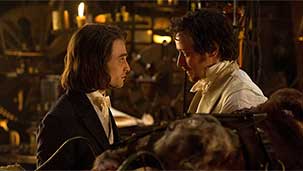Victor Frankenstein is a film of such obvious conceits that you can almost hear the elevator pitch. “So… imagine Guy Ritchie directing a gothic romance/monster movie with homoerotic overtones.”
“Magic!”
The film is a tired and largely unimaginative retelling of Mary Shelly’s Frankenstein. The only potentially interesting change is that it is told largely from the POV of Igor—played gamely by Daniel Radcliffe. Even that conceit falls prey to your tendency to see every narrative as a way to stitch together various genre tropes in what you consider new and interesting ways.
Max, you are the epitome of self-circumscription (pun intended). Your definition of screenwriting, as it currently exists on your IMDB page, all but guarantees what you write will always end up as creatively vacuous as Victor Frankenstein, or this year’s underwhelming American Ultra. You might want to consider that the emptiness of your work has more to do with your writing than it has to do with the environment you lament.
It is not the visual excess, or the overt genre busting, or the playful edges that exist in the protagonist’s relationship that drag this film into the swampland of mediocrity—the same mire that the aforementioned Ritchie’s Sherlock Holmes or even the Underworld series swim in. No Max, it is the relentless lack of any kind of real character that wrecks this film utterly. There is not one genuine human voice anywhere in this work.
James McAvoy, as the titular Victor, chews every single ounce of the set he can sink his teeth into in a failed effort to inject some heart into what is essentially a filmmaking exercise rather than an actual movie. That McAvoy fails miserably is not for lack of effort, but simply there is nothing here for him to grab hold of. The story is literally a series of obvious signposts that see it lurch forward with no more intention or purpose than if a drunk followed a single high-banked road. It is as if you think it is possible to just skip the basics of plot and character by using visual and literary tropes to stand in for these essential elements.
Every scene is played as a nod and a wink at what came before (if I see one more iteration of the “it’s alive!” moment I will remove my own eyes with an ice cream scoop). As a consequence, the film rests on the idea that its weight comes from what Victor Frankenstein references rather than creating its own center of gravity. There is no skeleton here to hang the meat of the monster on—so the whole thing falls to pieces.
For a film that works hard to incorporate every Frankenstein moment ever—from the Hammer films to a half-clever nod to Mel Brooks Young Frankenstein—there is an undercurrent of dismissal that permeates Victor Frankenstein. If you don’t understand or respect the underlying strength of the source material, then why bother Max?
In fact, if there is one question I would really be curious to ask you Max, it is this: why should any of us bother when you clearly do not?
Sincerely,

Tim






